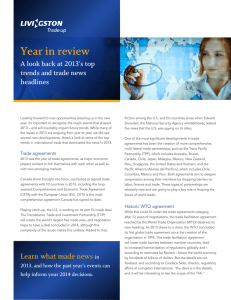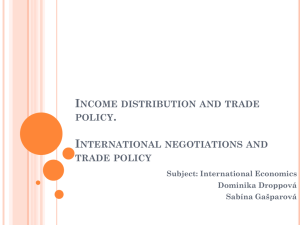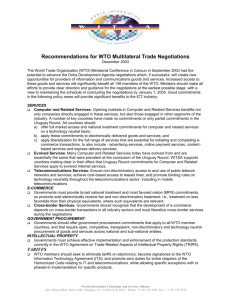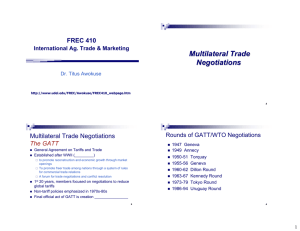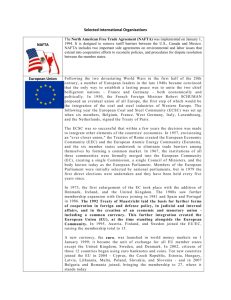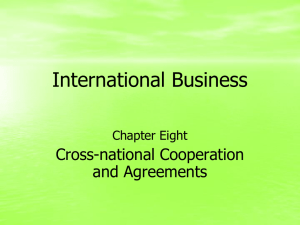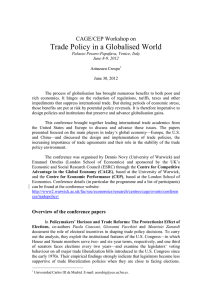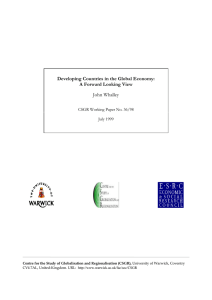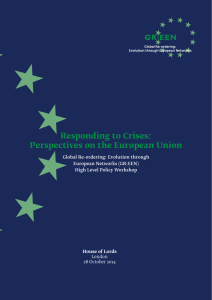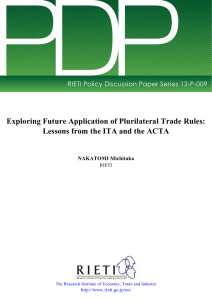references
advertisement
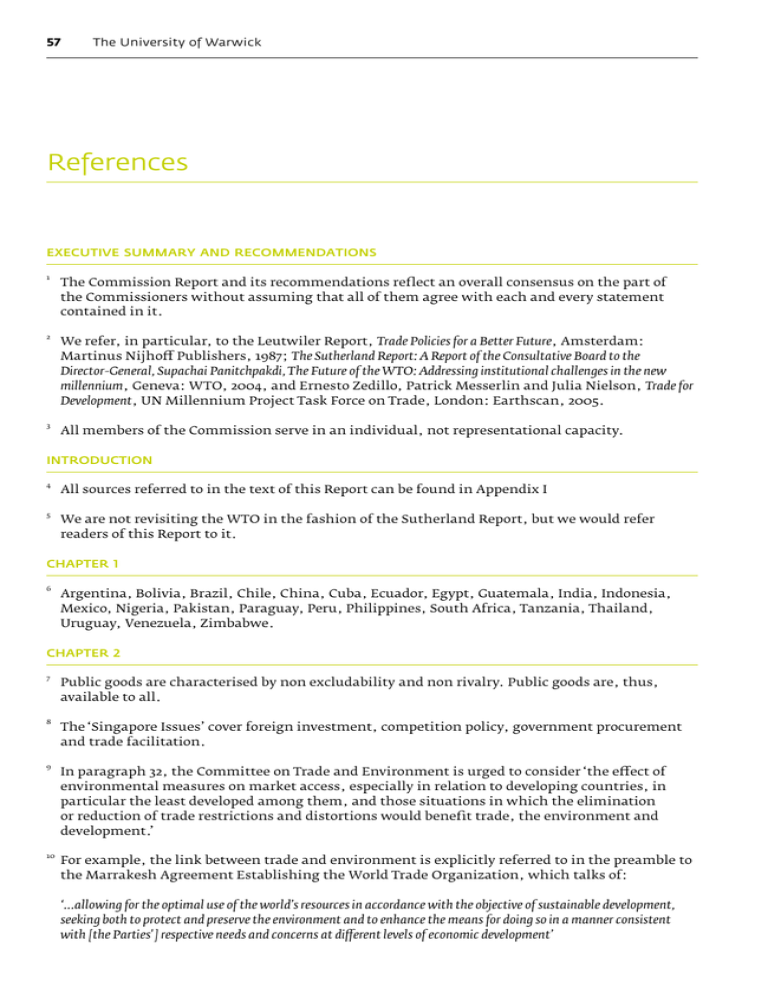
57 The University of Warwick References Executive Summary and Recommendations 1 The Commission Report and its recommendations reflect an overall consensus on the part of the Commissioners without assuming that all of them agree with each and every statement contained in it. 2 We refer, in particular, to the Leutwiler Report, Trade Policies for a Better Future, Amsterdam: Martinus Nijhoff Publishers, 1987; The Sutherland Report: A Report of the Consultative Board to the Director-General, Supachai Panitchpakdi, The Future of the WTO: Addressing institutional challenges in the new millennium, Geneva: WTO, 2004, and Ernesto Zedillo, Patrick Messerlin and Julia Nielson, Trade for Development, UN Millennium Project Task Force on Trade, London: Earthscan, 2005. 3 All members of the Commission serve in an individual, not representational capacity. Introduction 4 All sources referred to in the text of this Report can be found in Appendix I 5 We are not revisiting the WTO in the fashion of the Sutherland Report, but we would refer readers of this Report to it. Chapter 1 6 Argentina, Bolivia, Brazil, Chile, China, Cuba, Ecuador, Egypt, Guatemala, India, Indonesia, Mexico, Nigeria, Pakistan, Paraguay, Peru, Philippines, South Africa, Tanzania, Thailand, Uruguay, Venezuela, Zimbabwe. Chapter 2 7 Public goods are characterised by non excludability and non rivalry. Public goods are, thus, available to all. 8 The ‘Singapore Issues’ cover foreign investment, competition policy, government procurement and trade facilitation. 9 In paragraph 32, the Committee on Trade and Environment is urged to consider ‘the effect of environmental measures on market access, especially in relation to developing countries, in particular the least developed among them, and those situations in which the elimination or reduction of trade restrictions and distortions would benefit trade, the environment and development.’ 10 For example, the link between trade and environment is explicitly referred to in the preamble to the Marrakesh Agreement Establishing the World Trade Organization, which talks of: ‘...allowing for the optimal use of the world’s resources in accordance with the objective of sustainable development, seeking both to protect and preserve the environment and to enhance the means for doing so in a manner consistent with [the Parties'] respective needs and concerns at different levels of economic development’ The Warwick Commission 58 Similarly, on labour standards the text of the 1966 Singapore Ministerial Declaration states the following: ‘We renew our commitment to the observance of internationally recognised core labour standards. The International Labour Organization (ILO) is the competent body to set and deal with these standards, and we affirm our support for its work in promoting them. We believe that economic growth and development fostered by increased trade and further trade liberalisation contribute to the promotion of these standards. We reject the use of labour standards for protectionist purposes, and agree that the comparative advantage of countries, particularly low-wage developing countries, must in no way be put into question. In this regard, we note that the WTO and ILO Secretariats will continue their existing collaboration’ 11 Exceptions to the Uruguay Round Single Undertaking were the Agreement on Trade in Civil Aircraft, the Agreement on Government Procurement, the International Dairy Arrangement and the International Bovine Meat Agreement. 12 The Uruguay Round Single Undertaking also resulted in universal acceptance of other elements of the package emerging from the Round, including the new agreements on trade in services and trade-related intellectual property rights. 13 “Zero-for-zero” negotiations reduce tariffs to zero in selected sectors among participating parties. 14 The Agreement on Government Procurement was, and has remained, an exception since signatories are permitted to discriminate against non-signatories in this domain. 15 Paragraph B(ii) of the Declaration reads: ‘The launching, the conduct and the implementation of the outcome of the negotiations shall be treated as parts of a single undertaking, However, agreements reached at an early stage may be implemented on a provisional or definitive basis by agreement prior to the formal conclusion of the negotiations’ It would seem from the single undertaking language quoted here that, in 1986, governments were primarily concerned with ensuring the coherence and completeness of the process – in other words that nothing would be agreed until everything was agreed. It was only some seven years later in the closing stages and aftermath of the Round that it became fully apparent that every negotiating party would only become a Member of the WTO upon signature of every agreement in the Uruguay Round package – in other words, that the critical mass aspect of variable geometry embedded in the Tokyo Round results was no more. 16 A commentary on the DSU can be found in the Sutherland Report. 17 See Chapter VI, Section D. Chapter 3 18 Principal membership includes the IMF, World Bank and WTO as well as the International Trade Centre (ITC), the United Nations Conference on Trade and Development (UNCTAD) and the United Nations Development Programme (UNDP). 19 Aid for Trade comprises technical assistance, capacity building, institutional reform, investment in trade related infrastructure, assistance to off set adjustment costs in making transitions from tariffs to other sources of revenue. 59 The University of Warwick Chapter 4 20 Some 300 of them are trade agreements covering trade in goods and are notified under Article XXIV, whilst 58 cover trade in services and are notified under Article V of the GATS, and 22 are notified under the Enabling Clause of 1979, that is agreements between developing countries. 21 This last constraint does not apply if a CU partner has an applied common external tariff that is lower than a MFN binding, provided the negotiated MFN reduction in the bound tariff does not bring the latter to a level lower than the applied common external tariff. 22 An exception is the agreement between the Central American Common Market (CACM) and the United States, but even in this case, because the CACM is a CU, this was essentially a bilateral negotiation. 23 The formal designation of the 1979 Decision referred to as the Enabling Clause is the Decision on Differential and More Favourable Treatment, Reciprocity and Fuller Participation of Developing Countries. 24 Whether companies utilise tariff preferences or prefer to pay tariffs varies according to the restrictiveness of the rules of origin regime and other factors. 25 Enabling Clause, paragraph 3(b). 26 GATS Article V, paragraph 2. One interesting feature of Article V is the paragraph 6 requirement that foreign investors from outside the preferential area are to enjoy the benefits of the agreement if they have substantial business operations within the area. 27 Negotiations have been going in respect of non-preferential rules of origin since the entry into force of the results of the Uruguay Round in 1995. 28 See the Decision of 14 December 2006 entitled ‘Transparency Mechanism for Regional Trade Agreements.’
